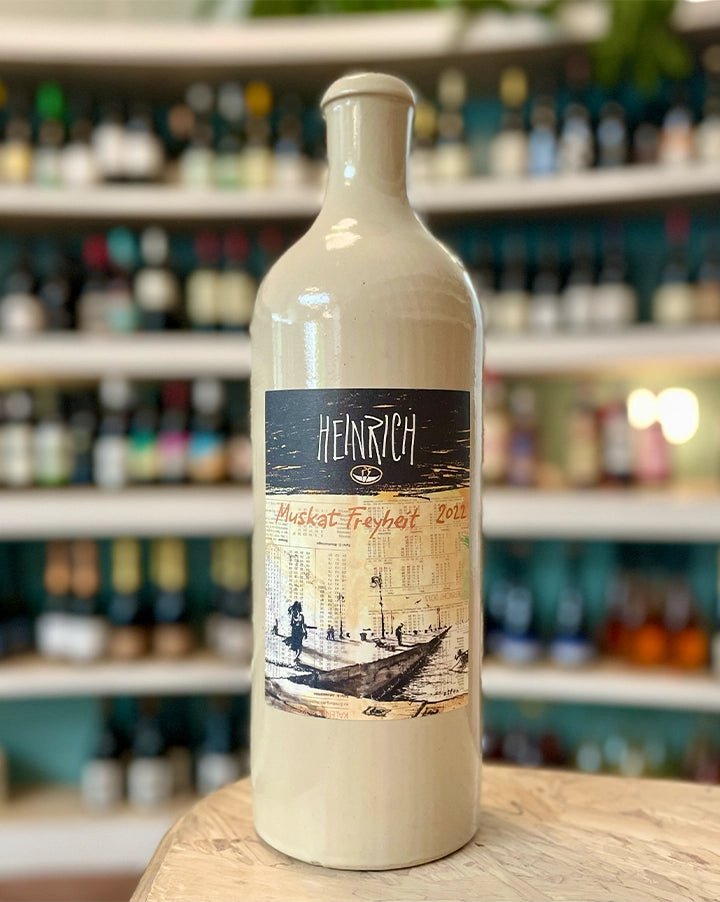Weingut Heinrich 'Muskat Freyheit' 2022 Skin Contact White Leithagebirge, Austria
Weingut Heinrich 'Muskat Freyheit' 2022 Skin Contact White Leithagebirge, Austria
750ml clay bottle
12% abv
Golden‑amber, with intense aromatics of kumquat, grapefruit peel, mandarin, green mango, candied fennel, and fresh herbs. Vibrant citrus and exotic fruit meet a creamy texture on the palate, with fine grip, fresh acidity, and chalky minerality. Long and lively finish, with a slightly bitter, herb‑citrus thing going on, and on, and on.
85% Muskat Ottonel, 15% Weißburgunder (Pinot Blanc) • 5.1 gl/ acidity • 1.1 g/l residual sugar • Bottled mid-June 2023
Biodynamic fruit from calcareous sandstone & gravel soils in Leithagebirge. Hand‑harvested, ~13 days skin contact in amphora, spontaneous fermentation, ~9 months aging on fine lees, unfiltered, minimal sulphur,
Grounded and sumptuous. Sumptuously grounded. Sensory impressions immediately open up to a splendid springtimey outing across verdant meadows with floral aromas, to a colourful juice bar that boasts the most enticing ingredients: kumquats, Sharon fruit and grapefruit meet coriander leaves (cilantro if you’re American), candied fennel seeds and wheat grass – to name just a few of the interweavings in this tightly woven olfactory carpet. For all its fragrance – captivating precisely because of its paradoxical unobtrusiveness – Muskat Freyheit mischievously presents its down-to-earth broadside on the palate, animated by an element of cool freshness. With a creamy texture – both enlivened & supported by delicate tartness, spirited piquancy is the watchword with this blithe spirit. As fabulous as it is ravishingly disarming, this potion is the vinous equivalent of the mad tea party with the Hatter from Lewis Carroll’s ‘Alice in Wonderland’. Shake the bottle with pleasure.
Deeply rooted in calcareous sandstone and mica schist soils on the eastern slopes of the Leitha Mountains and in the sandy-gravelly loam sediment on the south-facing escarpment of the Parndorf Plateau.
Bottled in a clay vessel with conscientious handcraft and great care throughout the entire life cycle. Biodynamic cultivation of the vineyards. Handpicked at the beginning of September, fermented spontaneously and left on the skins for 13 days in amphoras. Gently basket pressed, malolactic fermentation, finally matured 9 months in amphoras on its own lees and bottled unfiltered without added sulphur.
The term “natural wine” may be omnipresent, but it is not clearly defined. For us it simply means biodynamic viticulture and rigorous abstinence in the cellar. We respect our soil and our vines and rely on wild yeasts, spontaneous fermentation, maceration on the skins, maturation in wooden barrels, long lees contact, and the factor of time. Neuburger, Grauer Burgunder (Pinot Gris) and Roter Traminer (special type of Gewürztraminer) are each fermented on the skins. These varieties thus gain tannin structure and subsequently vitality; the spectrum of aroma shifts slightly and preconceived expectations of varietal typicity gain a new dimension. White wines that ferment on the skins break the boundaries of stereotypical conventions; they coax hidden qualities to the fore and lend grape varieties a harmony that would have been impossible to achieve in conventionally produced versions.
In many of the discussions about skin-fermented, orange and natural wines, the fact that red wines have always been fermented on their skins is somehow lost. This method contributes significantly to the style of a wine; that colour is extracted and additional structure, vitality and aroma are accumulated are welcome side effects. In the end, what we are trying to do is to continue the biodynamic philosophy that we practice in the vineyard, which is minimal and gentle intervention, in the wine cellar.
Great wines express a sense of place and they are best able to do this when they are rooted in a biologically diverse environment where soil vitality is intact and vines live in symbiosis with the complex ecosystem in which they live. To lend nature and its manifold aspects a voice through our wines is our ultimate aspiration. The ways and means to this objective are marked by many actions and fundamental decisions that set the course and reflect our ethical and qualitative philosophies. Our decision to convert to biodynamic viticulture in 2006 was based on the goal of making our vineyards successively more resilient, more vital, and more heterogeneous.
At the same time, we allow our wines and ourselves the freedom of increasingly less intervention. Regardless of the fact that all of our wines are fermented spontaneously and that we often like to leave them on the skins for weeks, it is above all else time that shapes our wines. Time for some means weeks, for others years – but all of our wines are given time with the intention of lending balance for their continued journey. To this end, wines remain unadulterated on their own lees, for the most part in used wooden barrels, and develop their own unique spectrum of aromas over time. We are mindful of these natural processes and observe them closely, but we influence them as little as possible, implementing our idea of producing authentic and truly genuine wines as rigorously as we can.
Share

